The Supreme Court on Tuesday said it would have to examine in the future the status of trial proceedings for offences under the Indian Penal Code (IPC) in cases where no sanction for prosecution is given for offences under the Prevention of Corruption Act (PC Act). [A Sreenivasa Reddy v. Rakesh Sharma and anr]
A Bench of Justices BR Gavai and JB Pardiwala made the observation while refusing to discharge a State Bank of India employee accused of forgery from criminal proceedings under the IPC.
“The object behind the enactment of Section 19 of the PC Act, 1988 is to protect the public servants from frivolous prosecutions. Take a case wherein, the sanctioning authority at the time of declining to accord sanction under Section 19 of the PC Act, 1988 observes that sanction is being declined because the prosecution against the accused could be termed as frivolous or vexatious. Then, in such circumstances what would be its effect on the trial so far as the IPC offences are concerned? Could it be said that the prosecution for the offences under the PC Act, 1988 is frivolous but the same would not be for the offences under the IPC? … What we have highlighted may be examined by this Court in some other litigation at an appropriate time,” the judgment said.
The apellant, who was working as an Assistant General Manager at the State Bank of India at the time of the offence, moved the Supreme Court against a Telangana High Court verdict that had refused to discharge him.
He was accused of fradulently sanctioning a corporate loan of ₹22.50 crore in favour of a Secunderabad-based company.
Before the top court, counsel for the appellant contended that being a public servant, prosecution sanction would be needed for IPC offences as well. Further, when sanction was not granted for prosecution under the PC Act, the trial court could not have proceeded with the case in relation to the IPC offences.
The apex court at the outset noted that prosecution sanction for IPC offences is only needed when the case involves public servants who cannot be removed from service without the sanction of the appropriate government.
On the other contention, the Bench observed that there is a material difference between the statutory requirements of Section 19 of the PC Act and Section 197 of the Criminal Procedure Code, both of which provide for sanction to proceed against public servants.
“In the prosecution for the offences exclusively under the PC Act, 1988, sanction is mandatory qua the public servant. In cases under the general penal law against the public servant, the necessity (or otherwise) of sanction under Section 197 of the CrPC depends on the factual aspects. The test in the latter case is of the “nexus” between the act of commission or omission and the official duty of the public servant. To commit an offence punishable under law can never be a part of the official duty of a public servant. It is too simplistic an approach to adopt and to reject the necessity of sanction under Section 197 of the CrPC on such reasoning.”
The Court explained the “safe and sure test” in this regard, where one has to ascertain whether the omission or neglect to commit the alleged offence would have made the public servant answerable for dereliction of official duty.
“He may have acted “in excess of his duty”, but if there is a “reasonable connection” between the impugned act and the performance of the official duty, the protective umbrella of Section 197 of the CrPC cannot be denied, so long as the discharge of official duty is not used as a cloak for illicit acts.”
It eventually proceeded to dismiss the appeal.
Advocate D Ramakrishna Reddy appeared for the appellant. Additional Solicitor General Aishwarya Bhati appeared for the Central Bureau of Investigation (CBI). Advocate Sidharth Sangal represented the State Bank of India
Source Link




